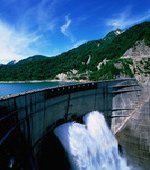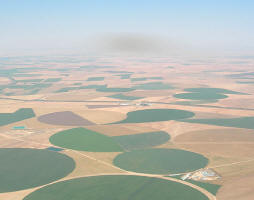 MEDAWARE
MEDAWARE
MEDAWARE - Development of tools and guidelines for the
promotion of sustainable urban wastewater treatment and re-use in
agricultural production in Mediterranean countries
website
Start date: 2003-05-01 - Duration (months): 42
Background
Water is an environmental, social and economic asset and as such needs to be managed with the objective of conserving a common patrimony in the interests of the community at large. Thus it is necessary and important to guarantee water availability over time by means of sustainable forms of management, which will allow the Mediterranean countries to cope with present demands without jeopardizing environmental balance and the needs of future generations.
The North African and Middle East Countries are characterized by the lowest per capita amount of water supply in the world, unequally distributed in space and time. The Mediterranean Water Chapter established in Rome in 1992 stressed the need to contribute towards the creation of new water sources. The Declaration of the Euro-Mediterranean Ministerial Conference on local water management, held in Turin, stressed the importance of integrating water resource management into sustainable development policies. It also stated the need for encouraging a participatory approach involving the general public, including water users and organizations at local, regional and national level. Another main aspect of this declaration is the statement that water scarcity could be alleviated through the mobilization of non-conventional water resources, such as re-use of wastewater. A significant problem for these countries is the lack of sufficient systems for urban wastewater treatment. Raw sewage is deposited into the sea, rivers, and pits or used for irrigation purposes, endangering human health and environment as a whole. The Barcelona Declaration obliges Mediterranean cities that do not belong to EU and that have a population of more than 100,000 inhabitants to install adequate water treatment systems to treat their sewage by the year 2005, while those with a population of more than 50,000 inhabitants must do so by the year 2010.
Geographical scope
The beneficiary countries are Cyprus, Jordan, Morocco, Lebanon, Palestinian Authority and Turkey. These countries are all represented in the consortium of this project proposal as follows: Agricultural Research Institute of Cyprus (Cyprus), Jordan University of Science and Technology (Jordan), University of Chouaib Doukkali (Morocco), The American University of Beirut (Lebanon), Ministry of Environmental Affairs (Palestine), Istanbul Technical University (Turkey), The Middle East Technical University (Turkey). The two EU countries that participate in this project proposal are: Greece, represented by the Technical University of Athens (Unit of Environmental Sciences, UES) and a non-profit organization called Prospect Systems; and Spain, represented by the Centro de Automatizacion, Robotica y Technologias de la Informacion y de la Fabricacion.
Objectives
The main objectives if this project perfectly match the strategies of those countries aiming at strengthening wastewater management and the utilization of treated effluent for irrigation purposes. UES has more than 20 years' experience in the field of environmental and waste management. It is very active in the areas of wastewater treatment, development of national strategies and action plans, environmental impact studies, analysis of the effectiveness of policies and measures, clean technologies and best available techniques, industrial risk assessment and hazard analysis, etc. It has a lengthy experience in applied research through national and European projects (more than 100), in training and educating programs, in participating in scientific committees and working groups concerning environmental subjects, etc. Additionally, it provides consultation and scientific assistance to the public and private sector and, as a participant in national and international environmental networks, is experienced in organizing conferences, seminars, workshops and courses related to environmental issues.
Therefore the transfer of knowledge, experience and know-how in Mediterranean countries will be of great value, particularly given that Greece and Spain are Mediterranean countries and therefore common interests are shared between all partners. The main objectives of the project are:
- The identification of the (i) existing situation in the participating countries in regards to water and wastewater management policy, (ii) the existing situation regarding the operation of urban wastewater plants and effluent disposal methods and practices applied, (iii) the potential negative impacts caused by the non orthodological operation of wastewater treatment and disposal methods, with particular emphasis on wastewater re-use in agriculture
- The development of specifications for urban wastewater treatment technologies and systems and also for methods of re-using agricultural wastewater, the aim being to present those in which effluent can be safely reused and easily adapted in a regional context, particularly when they are innovative.
- The development of appropriate tools and a database for the effective control and monitoring of the operation of wastewater treatment plants, including the drawing-up of relevant guidelines to ensure the safe operation of wastewater treatment plants.
- The development of a multi-criteria, user-friendly software programme that will guide the responsible authorities to the most efficient solutions in terms of health and safety for the agricultural re-use of the effluent produced, as well as in terms of sustainable operation of the treatment unit
- The Organization of a series of training workshops, conferences, pilot studies, etc., aimed at capacity building, information and know-how transfer and awareness-raising
- The establishment of a network between Mediterranean country authorities for the exchange of information and intra-regional transfer of experience
The expected results will be the intra-regional transfer of knowledge; increased awareness and training regarding relevant problems and opportunities; the reinforcement of capacity building to promote active involvement of all actors concerned in water planning and wastewater management; the dissemination of information on the role and effectiveness of training in spreading awareness with respect to opportunities for wastewater re-use; the sustainable operation of wastewater treatment plants; environmental advantages and the training of all project target groups, e.g. workers, farmers, operators and competent authorities on sustainable management of wastewater and safe re-use.
The project consists of eight tasks and one concerning project management.
Contacts
| Partners | Countries | Contacts |
| National Technical University Athens, School of chemical Engineering.
Unit of Environmental Sciences (Project coordinator) - web |
GR | Prof. Maria
Loizidou Dr. Despo Fatta |
| Agriculture Research Institute | CY | Mrs. S. Anayiotou |
| Faculty of Engineering and Architecture | LB | Prof. G. Ayoub |
| Jordan University of Sciences and Technology | JO | Prof. M. Al-Rusan |
| Chouaib Doukkali University, Laboratory of Water and Environment | MA | Prof. O. Assobhei |
| Ministry of Environmental Affairs | PS | Mohammed Eila |
| Middle East Technical University, Department of Environmental Engineering | TR | Prof. C. Gokcay |
| Istanbul Technical University Faculty of Civil Engineering Department of Environmental Engineering | TR | Prof. I. Arslan Alaton |
| Prospect Systems Environmental Protection Technologies and Systems | GR | Prof. G. Papadakis |
| Cartif, Centro de Automatimazion, Robotica y Technologias de la Informacion y de la Fabricacion | SP | Mr. A. Sandovar |
 you are not logged in
you are not logged in







